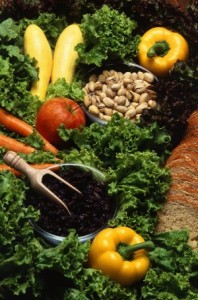Conventional thinking tells us that eating less will lead to weight loss. There are myriad diets and meal plans on the market that focus on the ‘energy in, energy out’ equation, with ‘energy in’ measured in our food’s kilojoule content. This leaves some people believing that they can eat whatever they like, as long as the numbers add up. A new study examines the benefits of food quality on weight loss, suggesting that participants in a weight loss program who ate a higher quality of food – as opposed to just the right number of kilojoules – lost more weight overall. In short, consumption of a wider variety of nutrient-dense foods may be beneficial to weight loss.
Background to the research
There is plenty of research to show that over-eating and a poor quality diet will lead to negative health outcomes. But when we think about ‘poor quality food’, we often picture the obvious extremes, like takeaways or packaged products. This study suggests we need to think more broadly about our definition of ‘good’ and ‘bad’ food, shifting the focus to consuming a variety of different foods, especially if trying to lose weight or planning a weight loss program. This research shows that a restricted kilojoule diet including a limited range of foods will not reap the same benefits as a program that offers a greater range of nutrients.
The study
Overweight and obese adults from regional NSW were recruited into three groups for this study: one participated in an online weight loss program, the second in an enhanced online program with personalised feedback, and the third was a control group. Participants in the ‘basic’ and ‘enhanced’ groups received free access to a popular online weight loss program (Biggest Loser Club), whilst the control group agreed not to participate in any specific weight loss activities over the 12 weeks of the study.
Diet quality was calculated using the Australian Recommended Food Score scale, which looks at dietary variety within core food groups. Participants were required to record the frequency with which they consumed certain items, such as fruits, vegetables, dairy, wholegrains and water, at the beginning and end of the 12 weeks. Trying different foods within the studied food categories attracted points, giving participants an overall ARFS.
In simplified terms, an increase of 1 point equates to consuming one new or different food at least once per week. So, eating a greater variety of fruit, for example, would attract more points than eating the same type of fruit several times – even though the kilojoule count may be very similar.
Conclusions
Over the 12 weeks, the basic and enhanced groups lost significantly more weight than the control group, as expected. The enhanced and basic groups achieved similar levels of weight loss. The more interesting conclusion was that participants with a higher ARFS at the 12 week mark lost more weight, independent of their total energy intake.
Weight loss increased by an average of 1% of body weight when the ARFS increased by 10 points. The enhanced group achieved the biggest overall changes to ARFS, which may be a result of the additional individual feedback during the study. The enhanced group generally chose to raise their ARFS by choosing a greater variety of fruit, meat and wholegrain foods, along with increased water consumption. Further study might examine whether an increase in other areas (like dairy, for example) has the same impact.
This research may be of interest to anyone keen to lose weight or maintain a healthy weight, but also to anyone charged with creating a meal plan for weight loss purposes. This study tells us that a focus on improved diet quality, by increasing nutrient variety, should be a factor in any weight-related diet or food plan.
Reference:
Kate M O’Brien, Melinda J Hutchesen, et al. (2014) Participants in an online weight loss program can improve diet quality during weight loss: a randomized controlled trial. Nutrition Journal, 13, 82.


